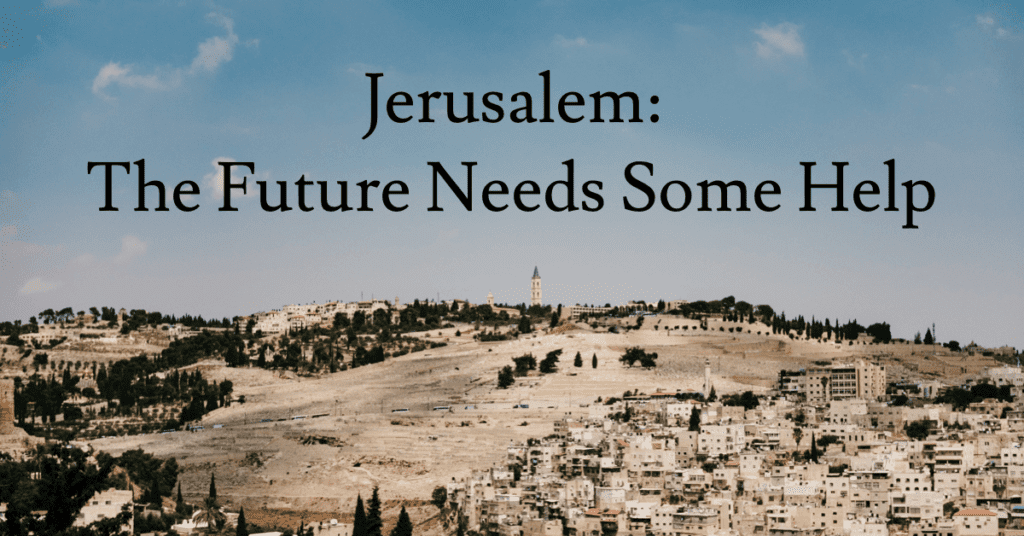Table of Contents
I am seriously worried about Jerusalem.
The city has made some impressive improvements in the last couple of decades. But if it keeps going on its current trajectory, I don’t think this is at all sustainable.
What am I referring to?
Overcrowded and Trafficky

The overcrowding and the traffic. Which are, obviously, highly connected with one another.
It doesn’t take a long trip to Jerusalem to recognize that something is very imperfect about the Holy City. Whenever we leave the city, I always brace myself for half the trip to be within the city itself. Why? Because driving around in Jerusalem from basically 8 in the morning until around that time at night means back-to-back traffic. So almost anywhere you’ll go will be a miserable and uncomfortable commute.
The whole situation is shocking to me.
When I left Israel in 2005, it felt like very few people had cars. I returned eleven years later to find a country stuffed to the brim with vehicles.
Yes, I also came back to a country with a fairly robust (and affordable) bus system, and trains popping up that have truly altered people’s lives for the better. But it doesn’t change the fact that if you get into your car in the city, you are almost guaranteed lots of traffic, several terrifying near-accident moments, and an awful time trying to park.
Homes and Homes and Homes

During that drive around the city, you will also inevitably drive past dozens of buildings under construction. Yes, some of them will be offices and stores. And those are great, because the city could certainly use more employment. But still, a whole lot of them will be new apartment buildings, or existing buildings with new units being added.
An already over-crowded city, with way too many cars, is constantly adding new homes so more people can move in, and several of them will grab some new vehicles to fill the roads even more.
What could possibly go wrong?
What About Other Cities?

The problems here are exacerbated for me because I pay too much attention to the news, and it highlights how other cities in the world are trying to fix the same problems. But it doesn’t feel like that’s the case here.
For example, what are some ways to deal with vehicle problem? One obvious answer would be for more people to take the bus. If just ten percent of the drivers in the city took a bus instead, it would significantly reduce traffic, it would make parking much easier, and it’s hard to ignore the positive impact on the environment.
But to make this happen, the city would need to somehow increase people’s desire to ride the bus. That’s, of course, kind of hard when the experience isn’t exactly pleasant, and even though one bus ride isn’t so expensive, several every week will definitely start to add up.
Some cities see an unsolvable problem. Others see a challenge, and a solution staring them in the face.
Several cities throughout the US have gone ahead and made local buses free. Imagine the effect in a city like Jerusalem! Of course many people would stick to their cars. That’ll never change. We don’t want people to stop buying or driving cars. We just need fewer cars and fewer cars on the road at any given time, and the net effect would mean significant improvements to the entire city.
I think I can safely assume even commerce would be increased. There have been times in which I chose not to go to town because I feared the parking situation and didn’t want to bother with the annoying bus system. Remove barriers, and next thing you know, my shekels are flying out of my pockets in town. Multiply that by hundreds or even thousands of people, and real, positive changes have been made to a city.
What about housing costs?

Another problem this city faces is unreasonably high housing costs.
It’s honestly outrageous how much it costs to live here. And it’s worse because the city seems void of quality employment. Yes, it’s even more expensive to live in Tel Aviv, but it’s the job hub of the entire country.
Now, one of the reasons the prices are so high is because of foreign property ownership. The prices rise to the people who can spend the most. So if a doctor who lives in New Jersey wants a holiday apartment in Jerusalem, he might be able to afford the extra splurge without a problem. And thus an expensive 3-bedroom apartment sits empty for most of the year, and drives up the prices for the grocery store clerk who actually needs a home for his daily doings.
You might say that this is just the way the world works. Capitalism is a bitch. Some win while others lose.
And there’s truth to that. I am not a fan of over-regulating the market. But this situation is not tenable. How much longer can a city cater to its wealthiest non-residents before those who actually want to live here are no longer capable of doing so?
But Jerusalem is not the first city to have such problems. Canada has the same problem, so the government chose to place a hold on non-residents being able to buy property. This might be enough to drive down costs and make it a more livable country for those who want to be there.
How much longer can a city cater to its wealthiest non-residents before those who actually want to live here are no longer capable of doing so? Share on XWho’s Looking Out For Jerusalem?

But where’s our government? Where are the committees dedicated to solving the most pressing problems the city has to offer?
I think of Jerusalem like a bubble that’s about to burst. The problems we have are getting worse every day, and even though there are improvements, they are not coming quick enough to deal with the issues we are facing. When we reach that critical moment, everything will fall apart. And what once was a thriving city will become a wasteland that no one wants to live in.
Now, am I saying we should fully prevent foreign ownership or make all the buses free?
Maybe.
But not necessarily.
All I’m saying is the time has come to put some of Israel’s most brilliant minds to work toward solving these problems. I propose a committee dedicated to uncovering Jerusalem’s most pressing issues, researching similar cities that have successfully dealt with similar problems, and then proposing solutions to the city. And hopefully working hard to implement those solutions right away.
It really can’t wait any longer.
If nothing’s done, sadly, I give the city ten more years before it’s barely livable.



